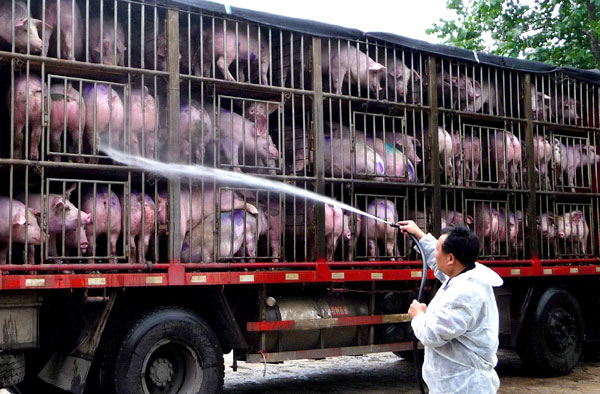Henan pigs enjoy 'VIP' treatment
Updated: 2012-06-30 07:36
By Shi Weijun (China Daily)
|
||||||||
Breeder Shi Weijun says his pigs enjoy VIP treatment because they will be exported to Hong Kong.
Shi works for the Yuming Livestock Co, which has exported more than 20,000 pigs annually to Hong Kong since 2009.
Located in a mountainous region in Luoshan county, in Central China's Henan province, the pig farm covers an area of 1,295 mu (86.33 hectares) with a total investment of 100 million yuan ($15.72 million).
 |
|
Pigs are disinfected at Yuming Pig Farm in Luoshan county, Henan province, before being transported to Hong Kong in September. Xiang Mingchao / China Daily |
More than 14,000 pigs live on the farm, including 1,300 females used for breeding.
Shi cleans the facilities every day to avoid bacterial infections, feeds the pigs high-quality animal feed, and gives the animals physical checkups every month.
"Pregnant pigs eat fish soup every day to provide enough nutrition for the babies," Shi said.
"Male pigs used for breeding have two eggs at lunch to maintain their protein levels," he added.
Visitors are required to go through strict sanitation procedures.
"We don't allow strangers in the facilities because we are afraid of viruses from the outside," Shi said. "Sanitation and disease-prevention are the most important things to us."
The quality of the animal feed is strictly monitored by the Henan Entry-Exit Inspection and Quarantine Bureau to make sure that no harmful additives, such as lean meat powder, are fed to the pigs, Shi said.
Dong Qingping, an official at the animal quarantine section of the bureau, said that all the pigs sold to Hong Kong have to be quarantined before they are shipped to a port in South China's Guangdong province.
"Whenever the pigs are about to be loaded, we test samples of their urine and blood," she said.
If drug levels in the urine are abnormally high, the pigs will not be exported, Dong said.
Pigs unable to stand steadily are always suspected of having contracted foot-and-mouth disease, which might infect human beings, she said.
However, the pigs are not always cooperative when going through blood tests.
"Last week, a pig weighing more than 100 kilograms stepped on my right foot," she said. "It still hurts."
Henan province is the largest supplier of live pigs to Hong Kong, with an average of 220,000 pigs exported to Hong Kong annually, said Guo Qixiang, deputy director of the animal quarantine section of the bureau.
An increasing number of companies are building pig farms in the coastal Guangdong province rather than in the inland Henan province to save on transportation costs, according to Guo.
"Pigs lose on average 8 percent of their weight after they are transported from Henan to Guangdong for nearly 20 hours," he said. "They will also be depressed after the trip, which will affect the flavor of the meat."
The bureau has always attached great importance to the inspection and quarantine process for the pigs exported to Hong Kong. Selling pigs to the region is more of a "political task" than a business, Guo said.
"We have to provide safe pork to Hong Kong people," he said.
Shi, the pig farm worker, said that the company is dedicated to the stability of the pork market in Hong Kong.
"Sometimes the live pigs prices in Hong Kong are lower than that in the mainland. However, we keep supplying pigs to Hong Kong even though the profits are shrinking," he said.
Contact the writers at anbaijie@chinadaily.com.cn and xiangmingchao@chinadaily.com.cn

 Relief reaches isolated village
Relief reaches isolated village
 Rainfall poses new threats to quake-hit region
Rainfall poses new threats to quake-hit region
 Funerals begin for Boston bombing victims
Funerals begin for Boston bombing victims
 Quake takeaway from China's Air Force
Quake takeaway from China's Air Force
 Obama celebrates young inventors at science fair
Obama celebrates young inventors at science fair
 Earth Day marked around the world
Earth Day marked around the world
 Volunteer team helping students find sense of normalcy
Volunteer team helping students find sense of normalcy
 Ethnic groups quick to join rescue efforts
Ethnic groups quick to join rescue efforts
Most Viewed
Editor's Picks

|

|

|

|

|

|
Today's Top News
Health new priority for quake zone
Xi meets US top military officer
Japan's boats driven out of Diaoyu
China mulls online shopping legislation
Bird flu death toll rises to 22
Putin appoints new ambassador to China
Japanese ships blocked from Diaoyu Islands
Inspired by Guan, more Chinese pick up golf
US Weekly

|

|






